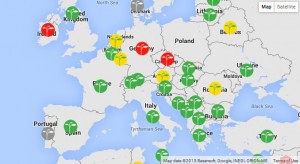DRPI has contributed to World Map of on the implementation of UNCRPD 2015 prepared by Zero Project – check out our findings gathered through DRPI projects and findings of other DPOs worldwide.
Access the indicators and map.

Additional information:
Social Indicators are one of the three areas of research conducted by the Zero Project, together with Innovative Practices and Innovative Policies.
The Zero Project Social Indicators aim to complement the work of national monitoring bodies, federal bureaus of statistics and international organisations that measure the implementation of the UN CRPD. They are based on questionnaires that are filled in by country experts who assess the implementation in their own country (or country state). The questions are designed to focus on concrete implementations of the most important rights granted by the UN CRPD, as stated in its Articles.
The Zero Project questionnaire 2015 consisted of 30 questions referring to key articles of the UN CRPD grouped under 9 themes, with a particular focus on independent living and political participation. Data collection was sent to networks of experts such as NGO officials, academics, public, including DPI members to collect perspectives and measure the implementation of the Convention on the Rights of Persons with Disability.
Quantitative data analysis comprised of statistical analysis issued from each questionnaire answers which was then grouped into the 9 themes of the questionnaire. The qualitative analysis is grounded in the context of the CRPD. It followed a coding procedure of each comment to identify major trends, issues, challenges, innovative initiatives and actions taken in line with the implementation of the CRPD under the 9 themes. Based on the trends and taking the geography of replies into consideration, conclusions and priority areas were highlighted to clearly frame areas needing attention and action planning.
Find out more about our Social Indicators on accessibility and on independent living and political participation.
The research topic of 2015/16 will be education.